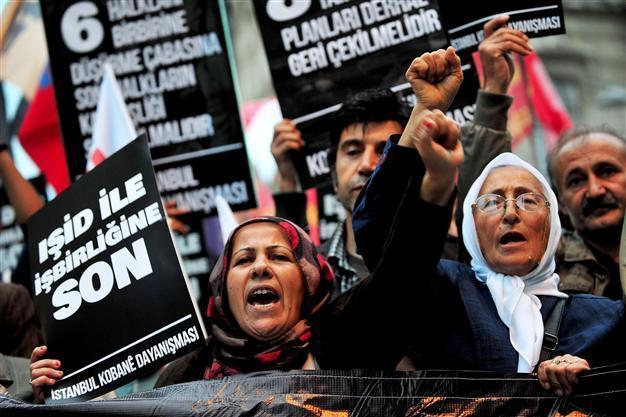Senior PKK leader says US could mediate in Turkey talks
VIENNA - Reuters

Demostrators shout slogans and hold placards 'End the cooperation with [Islamic State in Iraq and the Levant] ISIL' against the Turkish government, during a demonstration on Oct. 25 in Istanbul. Tensions have risen sharply amid accusations that Turkey was refusing to intervene militarily to help Kurds defending the besieged Syrian border town of Kobane against ISIL militants.
The outlawed Kurdistan Workers' Party (PKK) wants an international mediator, possibly the United States, to help get peace talks with Turkey back on track and avert an escalation of their insurgency, a senior commander of the organization has told an Austrian newspaper.Cemil Bayık, a founding member and leading figure of the PKK, also reiterated accusations that Turkey was waging a proxy war against the Kurds in neighboring Syria by backing Islamist rebels fighting them in the north of that country.
Syria's civil war has complicated Turkey's efforts to make peace with its own Kurds but Ankara strongly denies backing any Islamist faction against the Kurds in Syria and has held regular talks with the head of a Syrian Kurdish group close to the PKK.
"There can be no solution with war, so there has to be a political solution [in the PKK's conflict with Turkey]," Bayık told Der Standard newspaper in an interview published on Nov. 3.
"We have now reached the point where there has to be movement. That is why we are suggesting a third power observe this process. This could be the United States. It could also be an international delegation."
"We need a go-between, we need observers. We would also accept the Americans. From our view it is moving in this direction," he added.
The United States, like its NATO ally Turkey and the European Union, classes the PKK as a terrorist organization.
The PKK has fought Turkish security forces for three decades in a conflict that has claimed more than 40,000 lives. However, its jailed leader Abdullah Öcalan began talks with Turkish officials on January 2013 to halt the conflict. In March, Öcalan called a ceasefire was called and PKK militants were instructed to retreat from Turkey to Iraq's autonomous Kurdistan region.
The withdrawal was suspended in September as the PKK said Ankara had not held up its side of the bargain.
Tensions have risen sharply after Turkey was accused of refusing to intervene militarily to help Kurds defending the besieged Syrian border town of Kobane against the Islamic State in Iraq and the Levant (ISIL) militants, though Ankara allowed Iraqi Kurdish forces in recent days to cross its territory into Syria to cross to northern Syria.
The allegations against Ankara prompted angry Kurds in some Turkish towns and cities to stage protests in which around 40 people have died. Tensions have escalated since, particularly after three off-duty soldiers were killed in Hakkari and a fourth one in Diyarbakır in the last 10 days. The Turkish General Staff blamed the PKK for both murders.
Der Standard said it conducted its interview with Bayık at an undisclosed location in Iraq close to the Iranian border.
















